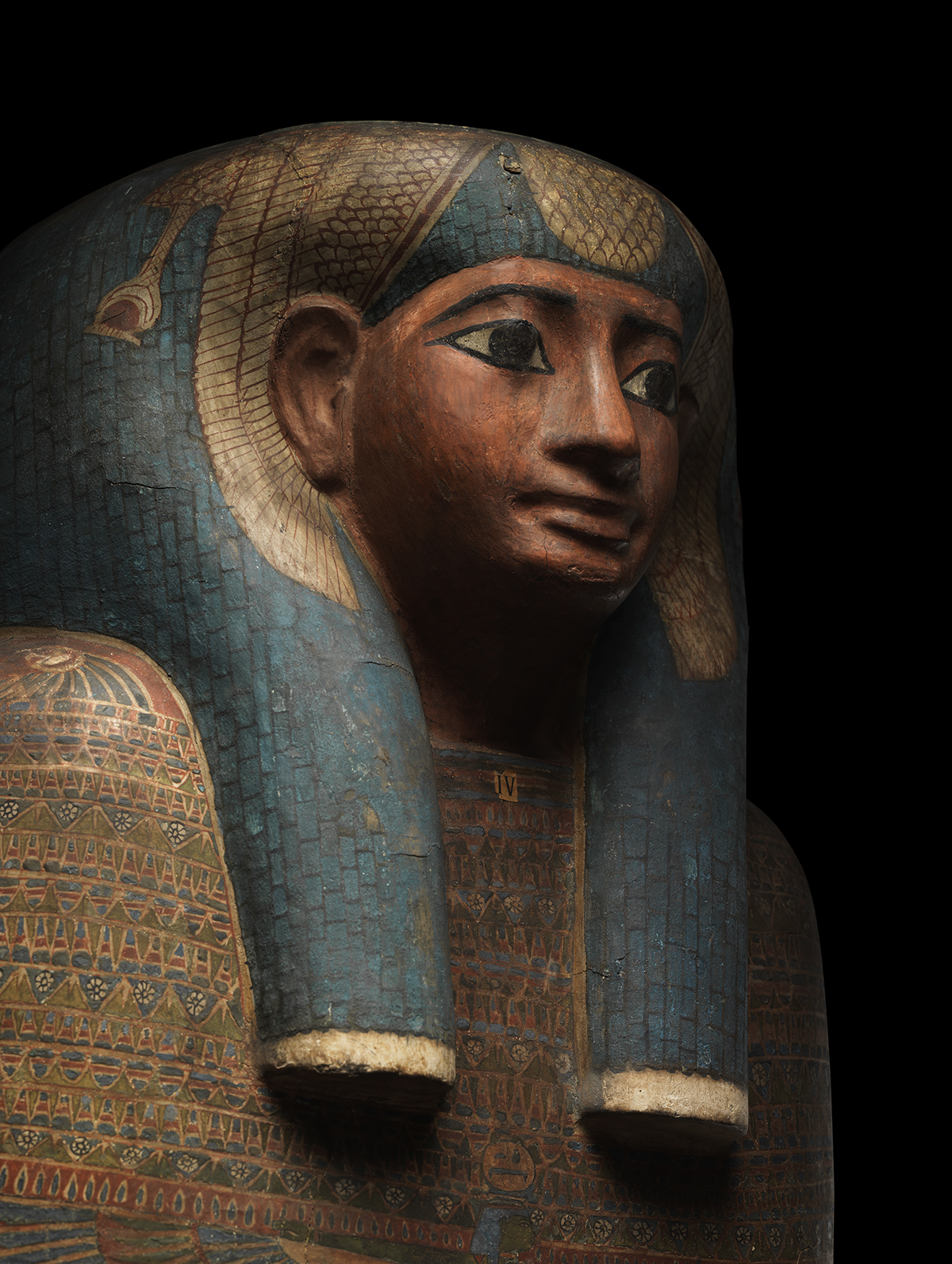
‘The Forgotten Princess’ presented by David Aaron Ltd, will be the first public display in the UK of the extraordinary fully painted wooden polychrome inner sarcophagus of Princess Sopdet-em-haawt. Details of her discovery, provenance and lineage were only recently uncovered when the sarcophagus was opened for the first time in two centuries in 2014 during conservation.
This rare and remarkably preserved artefact will be showcased at FRIEZE Masters from October 9th to 13th, coming straight from its six-year stint in the MFAH, (The Museum of Fine Arts, Houston).
The extensively decorated sarcophagus from the late 25th-Early 26th Dynasty, originates from Heracleopolis Magna, Egypt, most likely from the Theban necropolis at Sheikh Abd-el Qurna. Discovered in Saqqarah in 1832, it was first recorded by Robert Hay (1799-1863) in his field notebook, which is now kept in the British museum.
It entered the private French collection of Jules Xavier Saguez de Breuvery in 1834 and later passed through various private collections, including that of Monsieur Maffre de Baugé, until it was sold at Sotheby’s in New York in 2013.
The sarcophagus was opened for the first time in two centuries in 2014, not only revealing the incredible yellow and white highly inscribed interior but also priceless details of its discovery and provenance in the form of a handwritten pencil note from 1834.
One of the most iconic forms of ancient Egyptian art, characterized by vibrant colours, and distinct styling, the face of the princess features full lips, wide-set almond-shaped eyes, and slender tapering eyebrows. Topped with a voluminous tripartite wig of echeloned rectangular curls and a vulture headdress, the sarcophagus is painted with an idealised depiction of Princess Sopdet-em-haawt, adorned with symbols of royalty and protection.
Her coffin’s intricate decoration and well-preserved state provide invaluable insights into the workshops of the Theban area during the Late Period of ancient Egypt and allows us to accurately date the sarcophagus to the very end of the 25th or, the beginning of the 26th Dynasty.
Salomon Aaron, Director of David Aaron Ltd, expressed his excitement about the exhibition, stating, “It is a unique privilege to represent the Coffin of Princess Sopdet-en-haawt. It truly is a once-in-a-lifetime object.”
This sarcophagus is a centrepiece of David Aaron’s display at FRIEZE Masters and presents a rare opportunity for visitors to engage closely with a piece of ancient history that has been meticulously preserved and studied.
About David Aaron
Originally established in 1910 in Iran, the gallery rose to prominence in the 1920s when Soleiman Haroon (1890-1976) opened a second showroom in Alexandria, Egypt. In 1980 the gallery relocated to London, and Soleiman’s youngest son, David Aaron, opened his own gallery on Berkeley Square in 1998.
David Aaron Ltd is now managed by the third and fourth generations of the Aaron family, with a showroom located at 25A Berkeley Square, London. The gallery specialises in Classical Greek and Roman, Egyptian, Near Eastern, and Islamic works of art, as well as important items of natural history, such as large-scale dinosaur fossils.
The gallery annually exhibits at highly vetted international art fairs (including Tefaf, Masterpiece, Frieze Masters, Frieze Seoul, Fine Art Asia, and Guardian Fine Art, among others) and over the past century has played an instrumental role in helping major museums and private collections acquire and research important antiquities. Notable sales have been made to The Metropolitan Museum of Art, J. Paul Getty Museum, Louvre Abu Dhabi, The Aga Khan Museum, David Collection of Islamic Art, Miho Museum, Glyptothek Munich, Yorkshire Museum, and Corning Museum, to name a few.
The gallery is also a member of IADAA (International Association of Dealers in Ancient Art) and ADA (Antiquities Dealers’ Association).
About Frieze Masters
Frieze Masters brings together thousands of years of art in a unique contemporary context, featuring masterpieces ranging from the ancient era to the late 20th century. The fair provides a bridge between historical art and contemporary practice, offering a distinctive space where art enthusiasts and collectors can explore and appreciate art history in dialogue with the present.
